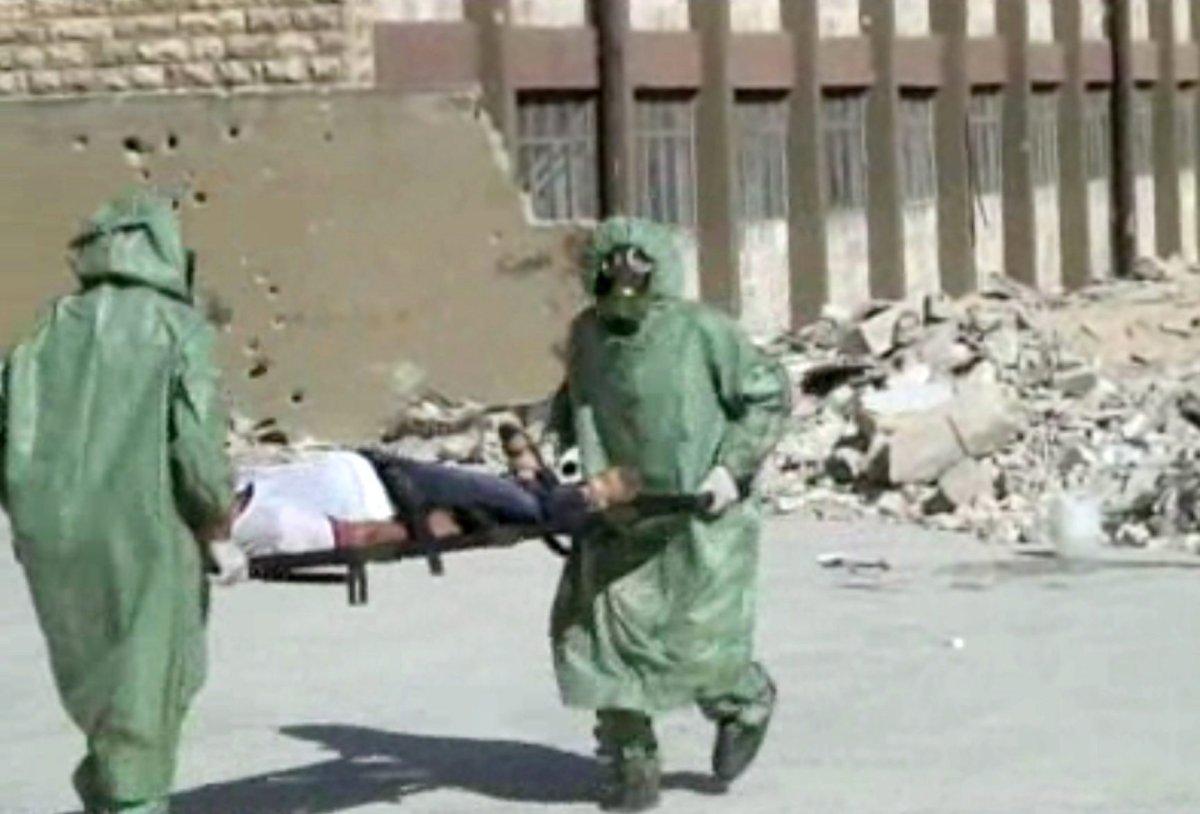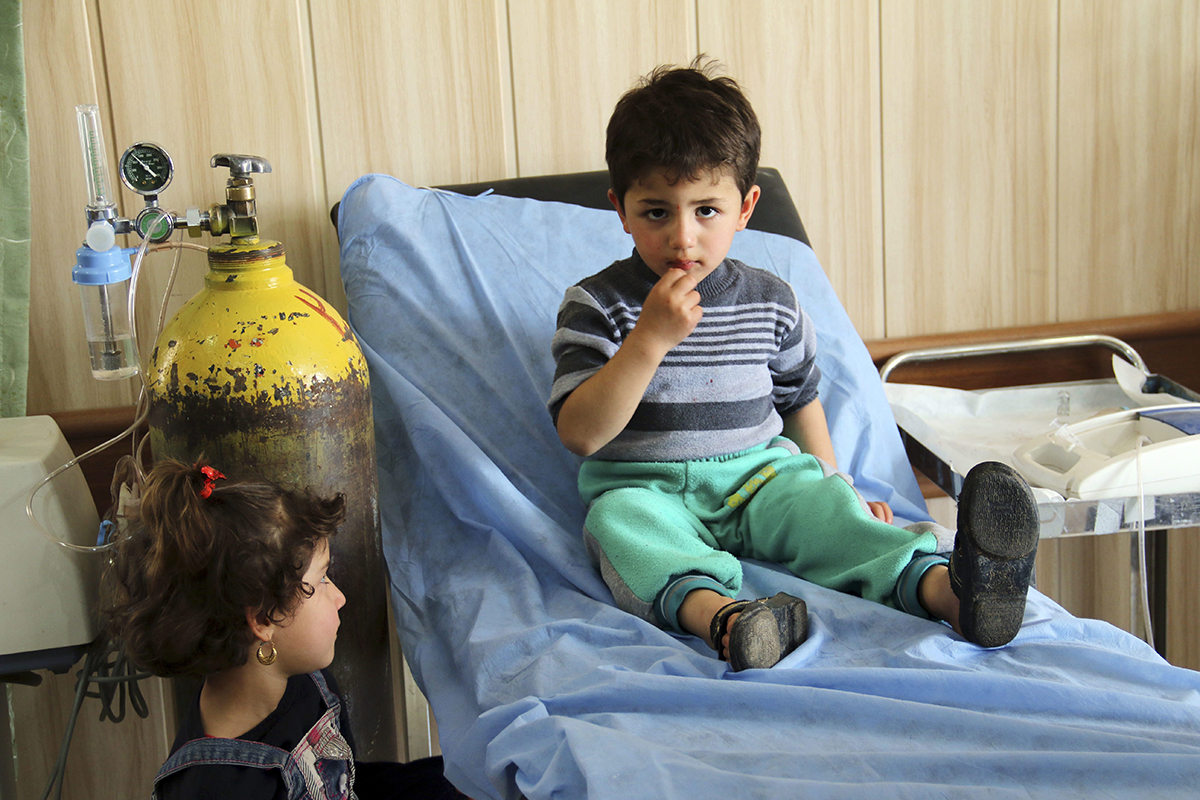BAGHDAD – The Islamic State group has launched two chemical attacks near the northern Iraqi city of Kirkuk, killing a three-year-old girl, wounding some 600 people and causing hundreds more to flee, Iraqi officials said Saturday.

“What the Daesh terrorist gangs did in the city of Taza will not go unpunished,” Iraqi Prime Minister Haider al-Abadi said using an alternative acronym for the IS group during a meeting with village elders in Taza on Saturday. “The perpetrators will pay dearly.”
Security and hospital officials say the latest attack took place early Saturday in the small town of Taza, which was also struck by a barrage of rockets carrying chemicals three days earlier.
Sameer Wais, whose daughter Fatima was killed in the attack, is a member of a Shiite militia fighting IS in Kirkuk province. He said he was on duty at the frontline when the attack occurred early in the morning, quickly ran home and said he could still smell the chemicals in the rocket.
WATCH: What can we learn from the leaked Islamic State documents?

“We took her to the clinic and they said that she needed to go to a hospital in Kirkuk. And that’s what we did, we brought her here to the hospital in Kirkuk,” he said.
Wais said his daughter appeared to be doing better the next day so they took her home. “But by midnight she started to get worse. Her face puffed up and her eyes bulged. Then she turned black and pieces of her skin started to come off,” he said.

Get breaking National news
By the next morning, Fatima had died, Wais said.
The hundreds of wounded are suffering from infected burns, suffocation and dehydration, said Helmi Hamdi, a nurse at the Taza hospital. He said eight people were transferred to Baghdad for treatment.
“There is fear and panic among the women and children,” said Adel Hussein, a local official in Taza. “They’re calling for the central government to save them.” Hussein said a German and an American forensics team arrived in the area to test for the presence of chemical agents.
U.S. and Iraqi officials said U.S. special forces captured the head of the IS unit trying to develop chemical weapons in a raid last month in northern Iraq.
READ MORE: Female recruits to ISIS: The recruiter’s call
The U.S.-led coalition said the chemicals IS has so far used include chlorine and a low-grade sulfur mustard which is not very potent. “It’s a legitimate threat. It’s not a high threat. We’re not, frankly, losing too much sleep over it,” U.S. Army Col. Steve Warren told reporters Friday.
Experts also say the extremist group appears incapable of launching a large-scale chemical weapons’ attack, which requires not only expertise, but also the proper equipment, materials and a supply-chain to produce enough of the chemical agent to pose a significant threat.
The coalition began targeting IS’ chemical weapons infrastructure with airstrikes and special operations raids two months ago, Iraqi intelligence officials and a Western security official in Baghdad told the AP.
Airstrikes are targeting laboratories and equipment, and further special forces raids targeting chemical weapons experts are planned, the officials said. They spoke on condition of anonymity because they were not authorized to brief reporters.
The extremist group is believed to have set up a special unit for chemical weapons research made up of Iraqi scientists who worked on weapons programs under Saddam Hussein as well as foreign experts.
The group is believed to have created limited amounts of mustard gas. Tests confirmed mustard gas was used in a town in Syria when IS was launching attacks there in August 2015. There have been other unverified reports of IS using chemical agents on battlefields in Syria and Iraq.
Separately, attacks across Baghdad Saturday killed 13 and wounded 27. The attacks were mostly carried out with homemade bombs placed along roads in the capital’s southern and eastern neighbourhoods. There were no immediate claims of responsibility, but the Islamic State group often claims responsibility for bomb attacks in the Iraq capital targeting civilians. As the group has endured territorial losses in Iraq – most recently the city of Ramadi which was declared “fully liberated” by Iraqi and U.S. officials last month – they have stepped up insurgent style attacks in Baghdad and other areas far from the front lines.
Hamish De Bretton Gordon, a former British army officer and chemical weapons expert, says the use of chemical weapons by IS also appears to be linked to losses on the battlefield.
“As they get more and more pushed, we’re seeing them use it more and more often,” he said. “They are trying to prevent defeat.”
The mustard agent that IS is using is not very toxic, Gordon says, but “it has a huge physiological impact that far outweighs its physical impacts.”
Fatima’s father Wais said he was planning to return to the frontline with IS as soon as possible. “Now I will fight Daesh more than before, for Fatima.”








Comments